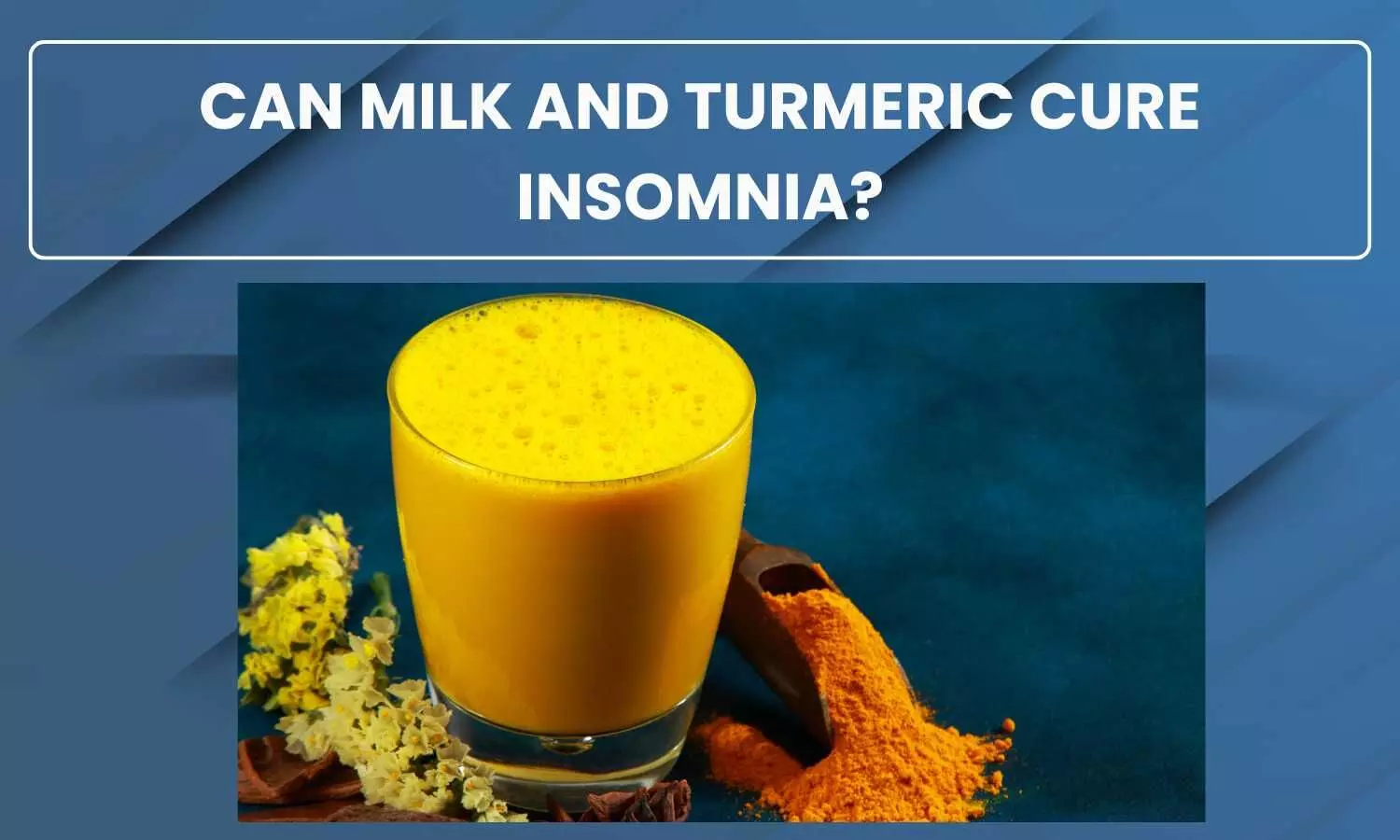Fact Check: Can milk and turmeric cure Insomnia?

Claim: An Instagram post claims that drinking turmeric milk can cure insomnia. In the post, the user suggests that half an hour before sleeping, drinking a glass of milk mixed with a small spoon of turmeric will help you sleep and cure insomnia. The post can be accessed here.
Fact Check: This claim is FALSE.
Milk and its Nutritional Properties
Milk is a nutrient-dense food, supplying energy and high-quality protein with a range of essential micronutrients like calcium, magnesium, potassium, zinc, and phosphorus in an easily absorbed form. Milk minerals are crucial for human health and development. They play a key role in healthy human nutrition and development throughout life. Milk is rich in nutrients that are essential for good bone health, including calcium, protein, vitamin D, potassium, and phosphorus. (1)
Lactose also known as “milk sugar” stimulates the growth of lactobacilli in the large intestine; these organisms synthesize many B vitamins. Lactose improves the absorption of several important minerals like calcium, phosphorus and magnesium. (2)
Health Benefits of Consuming Turmeric
Turmeric (scientific name: Curcuma longa), a spice that has long been recognized for its medicinal properties and is the major source of curcumin. Curcumin has received worldwide attention for its multiple health benefits, which appear to act primarily through its anti-oxidant and anti-inflammatory mechanisms. Research suggests that curcumin can help in the management of oxidative and inflammatory conditions, metabolic syndrome, arthritis, anxiety, and hyperlipidemia. (3)
What is Insomnia?
According to the National Institute of Health (NIH), Insomnia is a common sleep disorder. With insomnia, you may have trouble falling asleep, staying asleep, or getting good quality sleep.” (4)
The most common symptom of insomnia is difficulty in initiating and maintaining sleep in a conducive environment. The symptoms should be present for most days for at least 3 months. The symptoms may be co-existent with other sleep disorders. The symptoms may usually be triggered by various factors, including socio-economic and cultural factors. (5)
How is Insomnia treated?
Dr Sonal Anand, Psychiatrist, Wockhardt Hospitals Mira Road, Mumbai, explains, "We need to understand that as we age, the body’s BMR (basal metabolic rate) keeps going down every decade or so. Our sleep requirements hence go down. Some of us might not be able to sleep as much as before which comes naturally with aging. For good sleep, a bit of discipline is required. Screens and phones should be avoided for at least 2 hours before sleeping as the blue light interferes with our sleep induction. Getting up in the morning at a specific time every day is also equally important. The morning environment helps to regulate our day-night sleep cycle. Morning exercise makes the body ready for the day. Avoid afternoon naps or limit them to half an hour. Afternoon rest can be done in a comfortable armchair, avoiding the night bed. At night, the lights should be dim to create a conducive environment for sleep. Listening to soft music or reading something light and non-stimulating can also help. There are many podcasts available for sleep. Listening to such podcasts or sleep stories can help. The aim is to limit bedtime to 7 to 7 and half hours depending on individual requirements. A specialist must be consulted if sleep hygiene is not working so as to rule out medical conditions that can lead to sleep problems."
Can Milk and turmeric cure insomnia?
While some scientific studies indicate that milk and turmeric may have positive impacts on insomnia, there is no conclusive evidence to support the claim that these substances can cure insomnia.
An article published by Rosa M. Ortega et al. in Nutricion Hospitalaria found that milk contains tryptophan, an amino acid that aids in the production of serotonin and melatonin, both of which are crucial for regulating sleep. Additionally, milk possesses antioxidant, anti-inflammatory, and bioactive peptide components. The studies highlighted that increased milk consumption can favour achieving and maintaining quality sleep. (7)
In a study published in Food and Function by Min Young Um et al., it was noted that curcumin, the active ingredient in turmeric, may be useful in managing insomnia due to its anti-inflammatory and antioxidant properties. (8)
Furthermore, an article by Mahboobeh Ghasemzadeh Rahbardar et al. in Phytotherapy Research concluded that combining herbal ingredients like turmeric with conventional treatments may offer an effective natural alternative for managing insomnia. However, it is recommended that individuals consult healthcare professionals before using herbal remedies for insomnia. (9)
Despite these findings, there is no scientific evidence to support that milk and turmeric can cure insomnia. Further research is needed to establish their efficacy as standalone treatments for this condition.
What do experts say?
The Health Dialogues Fact Check Team spoke with Dr Rakesh K Chadda, former Professor and Head of the Department of Psychiatry and Chief, National Drug Dependence Treatment Centre, All India Institute of Medical Sciences, New Delhi, he said, “Milk and turmeric may have some soothing effect on the gastrointestinal tract and our digestive system and thus may help in bringing refreshing sleep. However, it is unlikely that milk and turmeric can cure insomnia. In fact, it is basically sleep hygiene that helps improve sleep. Basic principles of sleep hygiene, if followed diligently, can help a person overcome insomnia and other common sleep-related problems. Following a regular schedule of sleeping and waking time and leaving around half an hour for unwinding before waking time is of great help. It is preferable to have dim light once one goes to bed, which can also be switched off later. Bed and bedroom should be comfortable, and beds should not be used for any other activity besides sleeping and sex. It is advisable to have dinner atleast 2 hours before going to bed. Deep breathing exercises for a few minutes and meditation also help facilitate the induction of sleep.
One needs to avoid using screens (mobile, laptops or TV) for atleast one hour before the intended bedtime. Exercise should be avoided before sleep and should be done preferably in the morning. Certain other don’ts for treating insomnia include avoiding naps during the afternoon or evening, strict no to caffeinated drinks in the evening (4-5 hours before the intended time for sleep) and ‘No smoking or use of tobacco’ in the evening. Milk and turmeric may have a refreshing effect on the body and may help in bringing sleep, but as such, there is no apparent evidence that these can treat insomnia.”
Medical Dialogues Final Take
While milk and turmeric contain components that may positively impact sleep, there is no scientific evidence or medical consensus to support the notion that they can cure insomnia. Milk provides tryptophan, aiding in the production of serotonin and melatonin, and turmeric's active ingredient, curcumin, offers anti-inflammatory and antioxidant benefits. Experts stress the importance of proper sleep hygiene, such as maintaining a consistent sleep schedule and, creating a conducive sleep environment, over-relying on specific foods or beverages. Therefore, while milk and turmeric may enhance sleep quality as part of a balanced lifestyle, they cannot cure insomnia.
Hence, the claim that Insomnia can be cured by milk and turmeric is FALSE.
References
1. https://www.ncbi.nlm.nih.gov/pmc/articles/PMC6723869/
2. http://ecoursesonline.iasri.res.in/mod/page/view.php?id=6128
3. Hewlings SJ, Kalman DS. Curcumin: A Review of Its Effects on Human Health. Foods. 2017 Oct 22;6(10):92. doi: 10.3390/foods6100092. PMID: 29065496; PMCID: PMC5664031.
4. https://www.nhlbi.nih.gov/health/insomnia#:~:text=Insomnia%20is%20a%20common%20sleep,feel%20sleepy%20during%20the%20day.
5. https://www.ijsm.in/doi/IJSM/pdf/10.5005/jp-journals-10069-0131
6. Krystal AD, Prather AA, Ashbrook LH. The assessment and management of insomnia: an update. World Psychiatry. 2019 Oct;18(3):337-352. doi: 10.1002/wps.20674. PMID: 31496087; PMCID: PMC6732697.
7. Ortega RM, Jiménez-Ortega AI, Martínez García RM, Cervera-Muñoz A, Salas-González MD. Propiedades de la leche en la inducción del sueño [Properties of milk in sleep induction]. Nutr Hosp. 2023 Nov 22;40(Spec No2):12-15. Spanish. doi: 10.20960/nh.04947. PMID: 37929912.
8. Um MY, Yoon M, Kim M, Jung J, Kim S, Kim DO, Cho S. Curcuminoids, a major turmeric component, have a sleep-enhancing effect by targeting the histamine H1 receptor. Food Funct. 2022 Dec 13;13(24):12697-12706. doi: 10.1039/d2fo02087d. Erratum in: Food Funct. 2023 Jan 23;14(2):1259. doi: 10.1039/d2fo90096c. PMID: 36408594.
9. Ghasemzadeh Rahbardar M, Hosseinzadeh H. Therapeutic potential of hypnotic herbal medicines: A comprehensive review. Phytother Res. 2024 Jun;38(6):3037-3059. doi: 10.1002/ptr.8201. Epub 2024 Apr 10. PMID: 38595123.



